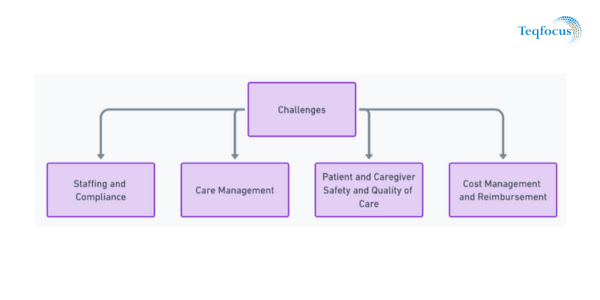
Challenges in the Homecare Industry

The homecare industry, dedicated to providing medical and non-medical services to individuals in their homes, faces numerous challenges that impact the quality and efficiency of care. These challenges include staffing and compliance issues, care management, patient and caregiver safety, quality of care, cost management, and reimbursement. Let’s discuss these challenges one by one.
Staffing and Compliance
One of the primary challenges in the homecare industry is staffing. The demand for homecare services has surged, driven by an aging population and the preference for receiving care at home. However, this demand has not been met with an adequate supply of trained caregivers. The shortage of qualified staff is exacerbated by high turnover rates, which are often due to low wages, demanding working conditions, and lack of career advancement opportunities.
Compliance with regulatory requirements adds another layer of complexity. Homecare providers must adhere to various federal, state, and local regulations designed to ensure the safety and well-being of patients. These regulations cover areas such as staff qualifications, patient rights, and care standards. Navigating the regulatory landscape can be challenging, especially for smaller homecare agencies that may lack the resources to stay updated on changing requirements and ensure compliance.
Care Management
Effective care management is crucial in homecare settings, where patients often have complex and chronic conditions. Coordinating care among various healthcare providers, ensuring adherence to treatment plans, and monitoring patient progress are essential components of care management. However, this coordination is often hindered by fragmented healthcare systems and inadequate communication between providers.
Technology can play a significant role in improving care management. Electronic Health Records (EHRs) and telehealth services can facilitate better communication and coordination among healthcare providers. Despite these advancements, many homecare agencies struggle to implement and integrate these technologies due to high costs and lack of technical expertise.
Patient and Caregiver Safety and Quality of Care
Ensuring the safety of both patients and caregivers is a critical concern in the homecare industry. Patients receiving homecare services are often vulnerable due to their age, illness, or disability, making them more susceptible to accidents and medical errors. Caregivers, on the other hand, face risks related to physical strain, exposure to infectious diseases, and potential violence in the home environment.
Quality of care is closely tied to safety. High-quality care involves providing timely, effective, and patient-centered services. However, maintaining consistent quality can be challenging due to factors such as varying levels of caregiver training and experience, resource limitations, and the diverse needs of patients.
Implementing standardized care protocols and continuous training programs for caregivers can help improve safety and quality. Additionally, regular assessment and feedback mechanisms can ensure that care standards are maintained and improved over time.
Cost Management and Reimbursement
Cost management is a significant challenge for homecare providers. Delivering care in a home setting involves various expenses, including staff salaries, medical supplies, transportation, and administrative costs. Balancing these costs while ensuring high-quality care is a constant struggle for many homecare agencies.
Reimbursement from insurance providers and government programs such as Medicare and Medicaid is another critical issue. The reimbursement rates for homecare services are often lower than the actual costs incurred by providers. Additionally, the reimbursement process can be complex and time-consuming, involving extensive documentation and adherence to stringent criteria. Delays and denials of reimbursement claims can create financial strain for homecare agencies, affecting their ability to provide continuous and high-quality care .
The homecare industry plays a vital role in the healthcare ecosystem by providing essential services to individuals in the comfort of their homes. However, it faces significant challenges that impact its ability to deliver safe, high-quality, and cost-effective care. Addressing staffing shortages, ensuring compliance with regulations, improving care management, enhancing patient and caregiver safety, and managing costs and reimbursement issues are critical to overcoming these challenges. By leveraging technology, implementing standardized protocols, and advocating for better reimbursement rates, the homecare industry can improve its resilience and continue to meet the growing demand for its services.
